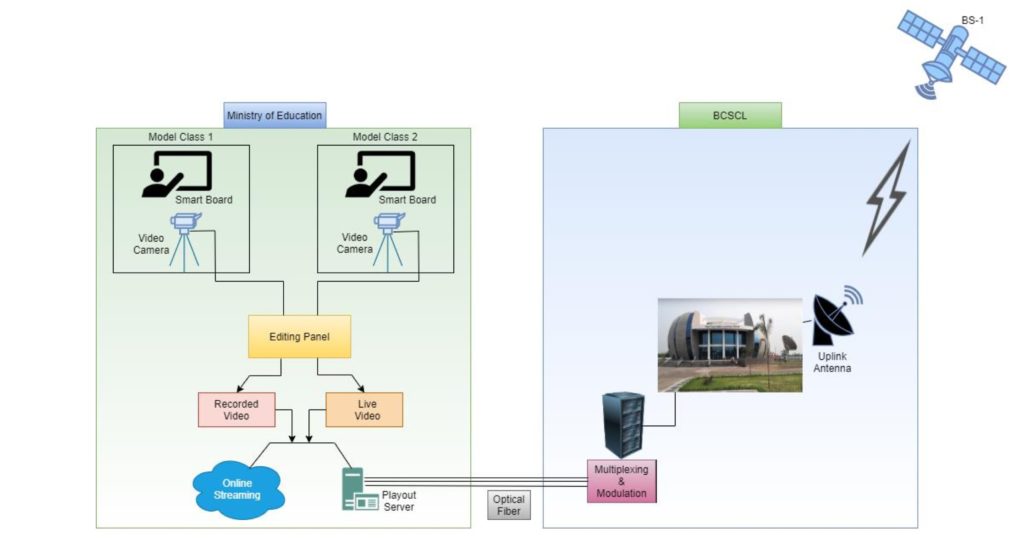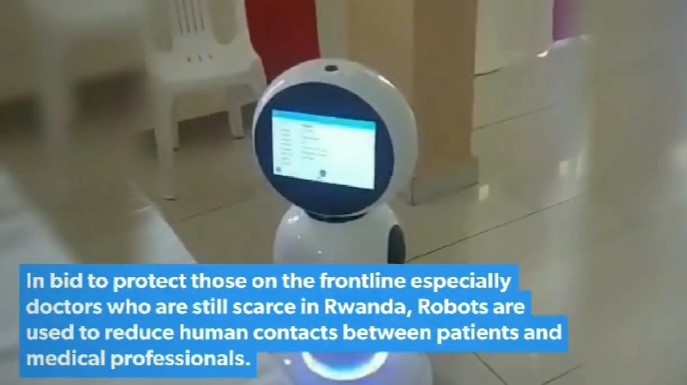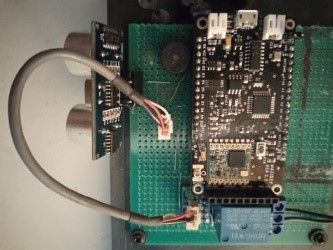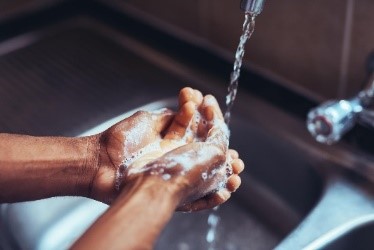As a developing country, tackling a pandemic like COVID-19 which has no cure and no prevention right now except staying behind locked doors and maintaining physical distancing is a hard job to do, and almost no administrative strategy works here. The economic strength of Bangladesh is not supportive to continue such a lockdown for a long time. Most of the wage earners live on a day to day income in this country. Where many of the offices, manufacturing plants, and shops remained closed for almost two months, educational institutes may remain closed for a longer period. Also, during this tough time, media is playing a major role. People are relying on TV channels to keep up to date.
Bangladesh entered the space industry and became the 57th country to own a satellite by launching its first satellite “Bangabandhu Satellite-1” in 2018. Since then, Bangladesh Communication Satellite Company Limited (BCSCL) has been operating the Bangabandhu Satellite-1 and enrolled all the TV channels of Bangladesh, which were using foreign satellites, saving more than $11 million cash outflow per year. For more than a year, BCSCL has saved the amount outflowing from the country by broadcasting all the TV channels using Bangabandhu Satellite-1.
During this pandemic, BCSCL has started a new horizon for a developing country like Bangladesh in the sector of education. A large number of students was deprived from getting education due to closing of the educational institutes. BCSCL primarily started showing lectures of different classes on a state-owned TV channel, “Sangsad TV”. Students from all over the country have the privilege of accessing knowledge through this initiative. Following this, BCSCL proposed a concept of several dedicated TV channels which will be broadcasted by Bangabandhu Satellite-1 all over the country. Students from every corner and every class can be connected by this project. Pre-recorded class lectures will be stored in a playout server and will be broadcasted all over the country using Bangabandhu Satellite-1. This technology may already be in use in many countries, but as a developing country where the literacy rate is just under 73%, this is a major step forward.
BCSCL is working collaboratively with other departments of government to give this proposal a shape and hopefully it will be in action within the shortest period of the time. This will not only enable students to enjoy class lectures during this lockdown, but will also in future enable much more, such as:
- Underprivileged children or others who cannot go to school or college during the day due to work will have the opportunity to learn at night.
- Where there is a shortage of quality teachers in many schools and colleges, all the students of those schools and colleges will get the opportunity to get education through quality teachers.
- During natural disasters or any other calamity, if access to schools and colleges are hampered, it will be possible to continue education distribution activities whilst maintaining the annual curriculum.
- All people irrespective of age and class will have access to education.

Fig: Simple Illustration of E-Education using Bangabandhu Satellite-1.
This vision would nonetheless have been implemented in the near future, but this pandemic situation has made people think diversely and enabled us to do things more quickly and efficiently than ever. We at BCSCL are looking forward to making a literate Bangladesh while we move forward to achieve Least Developed Country status and target achieving one hundred percent literacy rate amidst the major setback caused by COVID-19.

 It is possible to achieve protection of at risk individuals by leveraging the exponential power of ICT to bring community health workers (CHW) into mainstream-clinical-work, providing them with smart phone enabled with digital health solutions that are endowed with augmented artificial medical knowledge systems, clinical decision support tools and automated patient scheduling capability. Current mHealth platforms are capable of delivering such machine driven, automated chronic disease management solutions designed for remote patient monitoring and peer to peer consultations that allow for real-time sharing of patient clinical information between CHW, nurses and doctors.
It is possible to achieve protection of at risk individuals by leveraging the exponential power of ICT to bring community health workers (CHW) into mainstream-clinical-work, providing them with smart phone enabled with digital health solutions that are endowed with augmented artificial medical knowledge systems, clinical decision support tools and automated patient scheduling capability. Current mHealth platforms are capable of delivering such machine driven, automated chronic disease management solutions designed for remote patient monitoring and peer to peer consultations that allow for real-time sharing of patient clinical information between CHW, nurses and doctors. Different platforms, including websites that range from nursery schools to universities, provide access to all learning materials to help students at all levels who want to remotely keep track of their studies. With the resources provided, there are questions that can be used in the assessment of the students. The Ministry of ICT and Innovation acknowledged that some students do not have the resources to access the platforms like those without laptops and others in areas with poor internet connectivity, and therefore created broadcast and televised programmes on different radio and television channels.
Different platforms, including websites that range from nursery schools to universities, provide access to all learning materials to help students at all levels who want to remotely keep track of their studies. With the resources provided, there are questions that can be used in the assessment of the students. The Ministry of ICT and Innovation acknowledged that some students do not have the resources to access the platforms like those without laptops and others in areas with poor internet connectivity, and therefore created broadcast and televised programmes on different radio and television channels.
 Rwanda uses robots in the fight against the Novel coronavirus where programmable machines are used to do some of the tasks in the handling of COVID-19 cases as an interface between patients and medics, in a bid to minimize human-to-human contact and protect those on the frontline, especially doctors who are still scarce.
Rwanda uses robots in the fight against the Novel coronavirus where programmable machines are used to do some of the tasks in the handling of COVID-19 cases as an interface between patients and medics, in a bid to minimize human-to-human contact and protect those on the frontline, especially doctors who are still scarce. The simple act of hand washing is the single most cost-effective way of stopping the spread of COVID-19. However, the complexities that revolve around the handwashing exercise themselves pose the threat of a point to point spread of the virus. Some studies have shown that Sars-Cov-2, the name of the virus that causes COVID-19, can survive on metal, glass and plastic for as long as nine days, if not disinfected. At low temperatures, an extension of up to 28 days can be reached. These are the exact materials that most of the taps in our homes and public places are made of.
The simple act of hand washing is the single most cost-effective way of stopping the spread of COVID-19. However, the complexities that revolve around the handwashing exercise themselves pose the threat of a point to point spread of the virus. Some studies have shown that Sars-Cov-2, the name of the virus that causes COVID-19, can survive on metal, glass and plastic for as long as nine days, if not disinfected. At low temperatures, an extension of up to 28 days can be reached. These are the exact materials that most of the taps in our homes and public places are made of.
 device, a cloud-based communication mechanism that keeps track in real time the ON and OFF fluctuating pattern of the valve. From a demographic point of view, this makes it possible for a responsible organization or authority to monitor the sanitization patterns of its population and put necessary measures in place to ensure given directives are followed. With the installation process simplified, accelerated deployment will be easily achieved.
device, a cloud-based communication mechanism that keeps track in real time the ON and OFF fluctuating pattern of the valve. From a demographic point of view, this makes it possible for a responsible organization or authority to monitor the sanitization patterns of its population and put necessary measures in place to ensure given directives are followed. With the installation process simplified, accelerated deployment will be easily achieved.